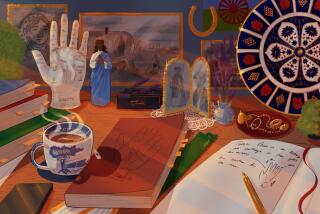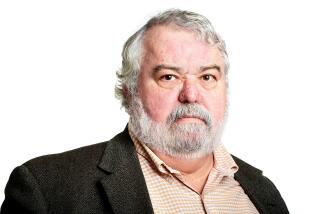Don’t mock the spiritual among us
- Share via
I was shocked and dismayed to read Tim Rutten lament that when it comes to matters of faith, “the problem is that so many [Americans] think they can believe anything -- and that believing one thing doesn’t preclude belief in another” [“Concoct a Word War? It Won’t Crack This Code,” May 20].
How many countless lives have been lost over the centuries because one religious ideology has insisted their beliefs precluded another’s?
And why should we (as Rutten suggests) want to “throttle” those who describe themselves as “spiritual” and are open-minded enough to include various religious icons in meditation altars in their yoga studios?
Such open-mindedness and spiritual independence should be celebrated, not derided as an “adjunct to the consumer society.” What would Rutten have us do? Pick one dogma and devote ourselves blindly to it?
Perhaps the real problem with faith in America is the myth that there is such a thing as “religious knowledge.” And I suspect the reason for “The Da Vinci Code’s” popularity is the idea that, when it comes to matters of the spirit and the divine, belief and personal connection are the only facts we can really know for sure.
JAMES VAN DER BEEK
Valley Village
*
THE controversy with “The Da Vinci Code” centers not on whether it or the Bible is accurate, but on religious zealots who are not content to believe what they believe, but need to convert the rest of the world to their beliefs.
I don’t have a controversy between “The Da Vinci Code” and the Bible within myself, because I don’t really care who believes which work is correct, if either one is -- and others shouldn’t care about what I believe either.
The reality is that both novels have some truths in them, and educated and thoughtful people need to figure what what these truths are.
FREDERICK E. KNAUSS
Laguna Beach
*
TIM Rutten’s incisive piece re the media and the brouhaha over “The Da Vinci Code” made a number of good -- and amusing -- points regarding Americans’ combination of “faith” or “spirituality” and materialism. I found it interesting, however, that at one point he seemed to single out the so-called “spiritual” person for ridicule. No doubt there are more than a few people who fit his ludicrous picture of spirituality through accessorization. Still, I think it’s worth pointing out that the strength of true spirituality (if you like that word) is that it’s not based on doodads or doctrine or even upon “faith” or “belief” but rather upon the simple day-to-day experience of one’s own infinite nature brought to awareness through daily practice, attention and presence.
This is something that may be easy to scoff at unless one has some firsthand experience of it. Furthermore, it may be too rare a thing in this society to be considered worthy of attention. Nonetheless, I would urge Rutten and the media in general to take it into account, particularly since it may well represent Humankind’s one real shot at redemption.
TED WATERHOUSE
San Luis Obispo
*
THE whole “Da Vinci” conflict is so idiotic, but the mass media love this stuff, precisely because it has no meaning. They can exploit it knowing it’ll just fade away.
How absurd is it for people to be quibbling over the imposition of one myth over another? What annoys me most is the way there’s an unquestioned assumption that, “Oh, of course, Jesus was a messiah and the son of God. And anything that messes with that is an outrage and affront to history.”
Please. It’s like being offended over a “revisionist” version of the Santa Claus myth.
DAVID M. KORN
New York City
More to Read
Sign up for our Book Club newsletter
Get the latest news, events and more from the Los Angeles Times Book Club, and help us get L.A. reading and talking.
You may occasionally receive promotional content from the Los Angeles Times.









